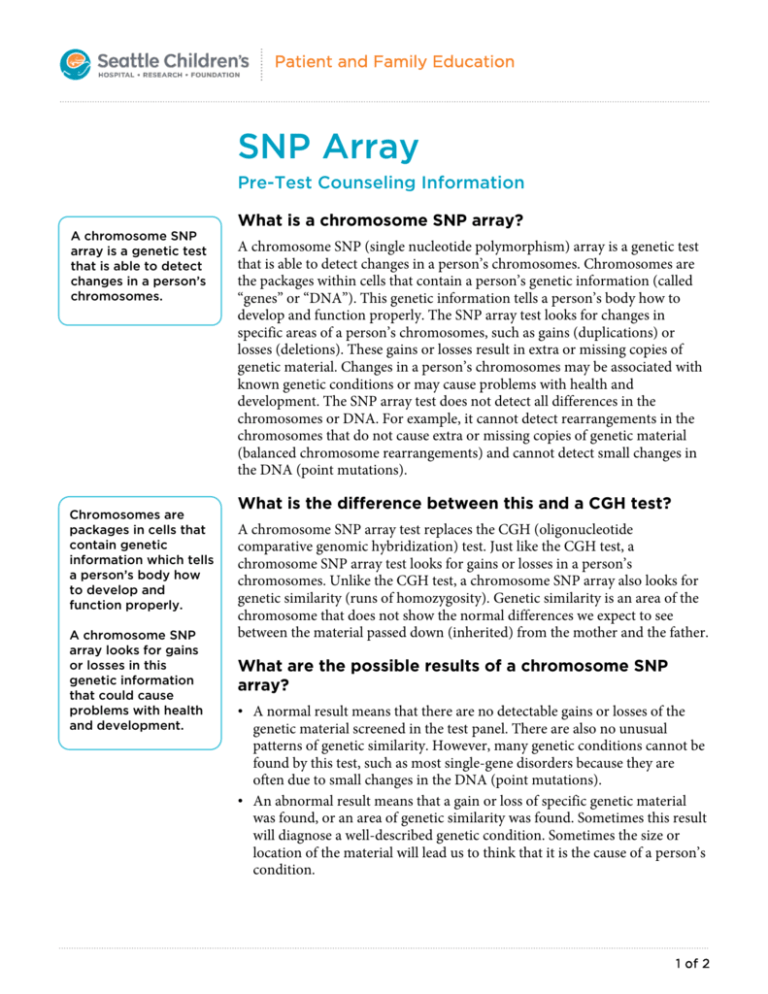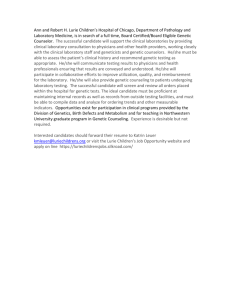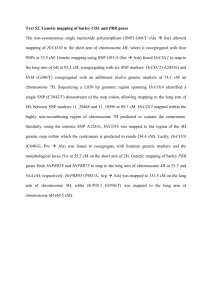
Patient and Family Education
SNP Array
Pre-Test Counseling Information
What is a chromosome SNP array?
A chromosome SNP
array is a genetic test
that is able to detect
changes in a person’s
chromosomes.
Chromosomes are
packages in cells that
contain genetic
information which tells
a person’s body how
to develop and
function properly.
A chromosome SNP
array looks for gains
or losses in this
genetic information
that could cause
problems with health
and development.
A chromosome SNP (single nucleotide polymorphism) array is a genetic test
that is able to detect changes in a person’s chromosomes. Chromosomes are
the packages within cells that contain a person’s genetic information (called
“genes” or “DNA”). This genetic information tells a person’s body how to
develop and function properly. The SNP array test looks for changes in
specific areas of a person’s chromosomes, such as gains (duplications) or
losses (deletions). These gains or losses result in extra or missing copies of
genetic material. Changes in a person’s chromosomes may be associated with
known genetic conditions or may cause problems with health and
development. The SNP array test does not detect all differences in the
chromosomes or DNA. For example, it cannot detect rearrangements in the
chromosomes that do not cause extra or missing copies of genetic material
(balanced chromosome rearrangements) and cannot detect small changes in
the DNA (point mutations).
What is the difference between this and a CGH test?
A chromosome SNP array test replaces the CGH (oligonucleotide
comparative genomic hybridization) test. Just like the CGH test, a
chromosome SNP array test looks for gains or losses in a person’s
chromosomes. Unlike the CGH test, a chromosome SNP array also looks for
genetic similarity (runs of homozygosity). Genetic similarity is an area of the
chromosome that does not show the normal differences we expect to see
between the material passed down (inherited) from the mother and the father.
What are the possible results of a chromosome SNP
array?
• A normal result means that there are no detectable gains or losses of the
genetic material screened in the test panel. There are also no unusual
patterns of genetic similarity. However, many genetic conditions cannot be
found by this test, such as most single-gene disorders because they are
often due to small changes in the DNA (point mutations).
• An abnormal result means that a gain or loss of specific genetic material
was found, or an area of genetic similarity was found. Sometimes this result
will diagnose a well-described genetic condition. Sometimes the size or
location of the material will lead us to think that it is the cause of a person’s
condition.
1 of 2
SNP Array: Pre-Test Counseling Information
To Learn More
• Genetic Counseling
Clinic 206-987-2056,
option 1
• Your child’s
healthcare provider
• www.seattlechildrens.org
Free Interpreter
Services
• In the hospital, ask
your child’s nurse.
• From outside the
hospital, call the
toll-free Family
Interpreting Line
1-866-583-1527. Tell
the interpreter the
name or extension you
need.
• A variant of unknown significance could mean that a gain or loss of specific
genetic material was found. But in this case, there is not enough
information about the specific genetic material to know whether or not it
will cause a genetic condition. If a person has this test result, we sometimes
recommend testing for parents to find out if this variant is new for the
person or inherited from a parent. This information is used to help decide
if this is a likely cause of a person’s condition.
• A variant of unknown significance could also mean that a region of genetic
similarity was found. Sometimes a genetic abnormality called uniparental
disomy (UPD) is suspected. UPD happens when more chromosome
material is passed down (inherited) from one parent than the other. If
multiple regions of genetic similarity are found by the SNP array, that
person’s parents might be more closely related than originally thought
(called consanguinity). For example, the parents might be related like
cousins. Additional testing of the parents may help us to better understand
a person’s result. If a region of genetic similarity is found, it could provide a
clue to a specific genetic condition and more genetic testing may be
recommended.
• A SNP array could also show results that are not directly related to the
reason the test was ordered. For example, the results could show that a
person is at risk to develop a genetic condition that happens later in life.
The results could also show that a person is a carrier for a genetic condition.
Insurance pre-authorization
Genetic tests, like the SNP array, are expensive tests that may or may not be
covered by a person’s insurance. Insurance plans are interested in knowing
whether the SNP array is medically necessary and if or how it will affect the
medical management of a person. Because of this, it is important for the
healthcare provider ordering the test to clearly document the reasons for
performing the SNP array in the medical record. Insurance pre-authorization
is recommended for genetic testing. Without pre-authorization, some patients
may have to pay for the SNP array test.
Genetic Counseling
A genetic counselor is available to discuss this information in more detail
your family. To reach a clinical genetic counselor at Seattle Children’s, call
206-987-2056.
Seattle Children’s offers interpreter services for Deaf, hard of hearing or non-English speaking patients, family members and
legal representatives free of charge. Seattle Children’s will make this information available in alternate formats upon request.
Call the Family Resource Center at 206-987-2201.
This handout has been reviewed by clinical staff at Seattle Children’s. However, your child’s needs are unique. Before you act
or rely upon this information, please talk with your child’s healthcare provider.
© 2012, 2015 Seattle Children’s, Seattle, Washington. All rights reserved.
11/15
PE1456
Genetic Counseling Clinic
2 of 2










![[CLICK HERE AND TYPE TITLE]](http://s3.studylib.net/store/data/006606986_1-782c3ecb8a70372ce425cead2575d909-300x300.png)